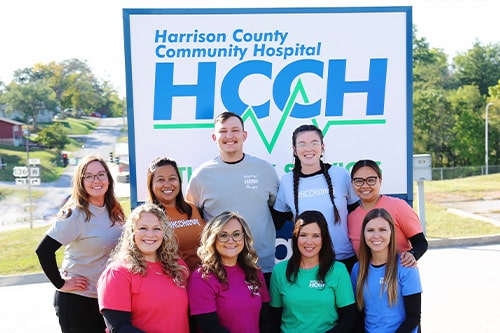Physical Therapy
We strive to exceed the expectations of our patients. Our staff utilizes a variety of techniques in manual therapy, strength and conditioning, sports medicine, and orthopedics. Using a hands-on approach, in a friendly and encouraging atmosphere. Our services offer an emphasis on exercise and manual therapy. Sessions are spent working one-on-one with therapy staff to ensure each patient is achieving the highest level of progress possible.
Therapy Services
2600 Miller Street
Bethany, MO 64424
Hours: Monday - Friday / 7:30 am - 5:00 pm
Phone: (660) 425-0236
Fax: (660) 425-7919

Physical Therapy Services
- Acute Chronic Back Pain
- After Care (Post-Therapy Exercise Continuum)
- Amputee Care (Lower-Extremity Mobility Programs)
- Arthritic Management
- Concussions
- Gait and Balance Training/Re-Education
- Hip, Ankle, and Knee Pain, Injury and Surgery Recovery
- Inpatient/Skilled Therapy
- LSVT BIG® and LSVT LOUD®
- Lymphedema
- Modalities
- Orthopedic and Sports Medicine
- Pain Management (Fibromyalgia, Myositis, etc)
- Pediatric Therapies
- Pelvic Floor Therapy
- Sciatica Problems and Disc Herniation
- Sports Related Injuries
- Stroke Rehabilitation
- Traumatic Brain Injuries
- Vestibular Therapy
- Work Related Injuries
Manual Therapy
Manual therapy is a specialized form of joint and soft tissue mobilization techniques delivered with the hands as opposed to a device or machine. In manual therapy, practitioners use their hands to manipulate tissue and joints in an attempt to decrease back pain caused by muscle spasms, muscle tension and joint dysfunction. Manual therapy provides more effective physical therapy treatments than just exercise and modalities alone. The hands-on techniques of manual therapy have been proven effective in treating issues that have been unresolved for years.
Sports Rehabilitation
Sports Rehabilitation is a multi-faceted treatment plan designed to get the athlete back to pre-injury abilities as quickly as possible. Treatment typically begins with pain management through various physical therapy modalities including ice or heat application and electrical or ultrasound stimulation.
Ultrasound speeds up the healing process by increasing circulation to the area of the injury, reducing painful swelling.
Electrical stimulation, or transcutaneous electrical nerve stimulation (TENS), relieves pain by using electrical waves to penetrate muscles.
Our therapists utilize manual therapy to rehabilitate each athlete with a plan customized for their specific athletic activity. Additionally, our HCCH therapists excel in creating an environment conducive to rapid recovery and maximum results.
Chronic Pain Management
We often talk about “movement, function, and freedom” being a common product of the therapy department at Harrison County Community Hospital. Chronic pain can inhibit all three.
Tens of millions of Americans are suffering from chronic pain. Whether merely inconvenient or incapacitating, pain lasting longer than six months makes a crushing blow to quality of life.
Oftentimes, chronic pain is present because the true source has not yet been identified. Our therapists possess an arsenal of tools utilized in restoring quality of life. They will try various techniques until they find one that works for you. We don’t want to mask your pain with medications, we want to help manage your pain and make it no longer “your pain”.
Balance and Fall Prevention
According to the World Health Organization, each year an estimated 424,000 accidental deaths are attributed to falls, making it the second leading cause of accidental death worldwide. An additional 37.3 million people seek medical attention for injuries resulting from a fall. Adults 65 years of age or older suffer from the greatest number of fatal falls.
Falls can occur for several reasons. Medical conditions, weakness, vertigo, poor mobility, decreased cognition, limited vision, side effects of medication, poor balance, and unsafe environments for those suffering from these conditions are just a few.
The therapists at Harrison County Community Hospital can help you develop a comprehensive and multifaceted fall prevention plan to identify and modify the risk of falling and the severity of injury should a fall occur.
Prevention strategies can include physical therapy as a method of increasing strength and balance as well as occupational therapy to assess the patient's home and identify environmental risk factors and utilization of appropriate assistive devices.
Lymphedema Care
Lymphedema is general swelling of the legs or arms often associated with the removal of or dysfunction of the lymph nodes. With physician guidance, lymphedema can be managed with early diagnosis and diligent care of the affected limb. Our therapists are dedicated to providing lymphedema services to improve the quality of life for many people living with this disease.
Pelvic Floor Therapy
A changing body is a natural part of life and maturity. It signals important changes that are universal to most women, but at the same time, affects every woman differently. At HCCH, our caring and compassionate team of experts can listen, evaluate and tailor a therapy program that can help. Our pelvic floor therapy program can help with the following pelvic floor dysfunctions:
- Urinary incontinence and other urinary issues such as stress incontinence, painful urination, urgency or loss of urine during sleep
- Fecal incontinence or the inability to hold back gas
- Constipation or painful bowel movements
- Chronic pelvic or bladder pain
Unsure if pelvic floor therapy is right for you? Take this quick pelvic floor therapy survey and find out if you could benefit from services.
LSVT BIG® and LSVT LOUD®


Program for Parkinson's Disease and Neurological Disorders
Do you or someone you know suffer from slow or decreased movement or difficulty speaking at full volume due to Parkinson’s Disease or a neurological condition?
Ask your doctor about a referral for our LSVT BIG® & LSVT LOUD® programs. These programs are proven to help regain normal function and movement for those suffering from neurological conditions and help condition those with speech issues to better understand their speech volume and feel more comfortable using a stronger voice.